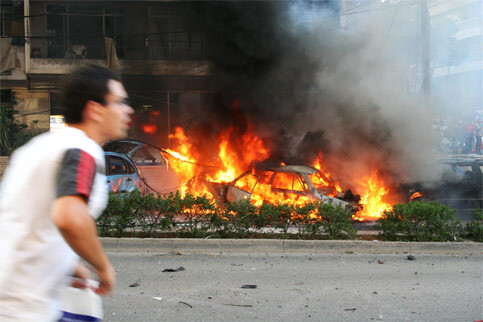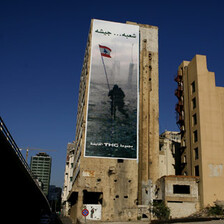Electronic Lebanon 20 September 2007

The massive car bomb that killed government MP Antoine Ghanem came less than a week before parliament was due to elect a new president and has pitched Lebanon deeper into crisis. (Toufic Chebib/IRIN)
BEIRUT, 20 September (IRIN) - Hajj Mustafa Zaatari, a baker from the southern Lebanese port city of Sidon, has little patience for his country’s beleaguered politicians as they struggle to overcome deep divisions ahead of electing a new president.
“Why would I want to talk politics?” he asks. “It’s the holy month of Ramadan, and politics in this country is blasphemy, pure blasphemy.”
With parliament set to re-open on 25 September, for the first time in just under a year, to begin electing a replacement to current President Emile Lahoud, analysts and citizens alike say their hopes for an end to divisions remain laced with fears of further instability.
The assassination on 19 September of Antoine Ghanem, a leading Christian MP touted as a possible compromise candidate for the presidency, raises serious doubts over whether parliament will indeed convene as scheduled.
Ghanem, a Christian Maronite member of parliament (MP) in Lebanon’s Phalange party, was killed in a massive car bomb in the Sin al-Fil neighborhood of east Beirut just two days after returning to the country along with at least six others. At least 30 other people were injured.
The site of the blast was just a few hundred meters from the residence of former president and head of the Phalange party Amin Gemayel, whose son, Pierre Gemayel, was gunned down in November last year.
Ghanem, 64, was the sixth figure allied to the ruling pro-West majority to be assassinated since the 2005 murder of billionaire five-time Prime Minister Rafik Hariri. There were three other attempted assassinations over the past three years.
Syria blamed
The government blames Damascus, once the power broker in Lebanese affairs, for the assassinations, which have targeted outspoken MPs and journalists opposed to Syrian influence in Lebanon.
Damascus has consistently denied the charge, though an ongoing UN investigation into Hariri’s murder found evidence of the involvement of Syrian and Lebanese intelligence officials in the killing.
“Sabotaging” the election
Members of the ruling coalition have portrayed Ghanem’s assassination as an attempt to derail the presidential election.
“This is an attack aimed at sabotaging all efforts to reach a solution to the current political crisis,” said Boutros Harb, an MP and presidential candidate. “You cannot separate this killing from the presidential election.”
Outgoing President Emile Lahoud, whom many in Lebanon consider a puppet of the Syrian regime after his term was extended at the behest of Damascus, is due to step down by 24 November. The constitution stipulates that parliament has two months to elect a new president ahead of the end of Lahoud’s term.
Journalist Ibrahim Beyram said a prompt election would mean “an automatic annihilation of the last Syrian stronghold in Lebanon.”
Lebanon’s confessional political system carves up power between Christians and Muslims, with the presidency reserved for a Maronite Christian, while the prime minister must be a Sunni Muslim and the speaker of parliament a Shia Muslim.
The constitution states that two-thirds of parliament must be present to elect a new president. Should less than two-thirds of MPs show up on the day, the government argues the vote should be rescheduled and would operate on a simple majority. The killing of Ghanem has reduced the ruling coalition’s majority to just three.
Political stand-off
Lebanon has been in a political stand-off for nearly a year between the Sunni, Druze and Christian coalition known as the March 14 forces, and the opposition comprising Shia movements Hizballah and Amal and the Christian Free Patriotic Movement of former Army General Michel Aoun.
Aoun is the opposition’s candidate for the presidency, while March 14 MPs Boutros Harb, Naseeb Lahoud and Minister of Social Affairs Nayla Mouawad have put themselves forward.
Having withdrawn its ministers from government last November arguing they were being ignored, the opposition demanded veto power over cabinet decisions and began an open ended protest outside the government offices in central Beirut.
Tensions boiled over in January with riots between Sunni and Shia students that killed three people.
Bruised and battered
The opposition protest is just one part of the worst spell of economic and security instability since the end of Lebanon’s ruinous 15-year Civil War in 1990.
Last July’s 34-day war between Israel and Hizballah militants cost Lebanon US$15bn, according to the UN Development Programme (UNDP).
The country was left even less capable of servicing its roughly US$40bn public debt — amassed during the huge post-Civil War reconstruction drive.
The resulting brain drain has further stripped this services-based economy of its chief input while a 15-week bloody conflict between the army and Islamist militants in a Palestinian refugee camp in north Lebanon did little to boost investor or tourist confidence, while reducing the homes of up to 40,000 Palestinians to rubble.
Balance of fear
The conflicts and crises that have beleaguered Lebanon served to tinge what has been a momentous period of change for the country.
Replacing Lahoud caps what has been for many Lebanese a journey of independence from Syrian tutelage that began with Hariri’s assassination, the overthrow of the Syrian-backed government and the subsequent withdrawal of Syrian troops, stationed in Lebanon since the end of the Civil War.
But with MPs being assassinated, Islamist militants threatening internal stability and Hizballah preparing its weapons for an expected resumption of war with Israel, analysts warn this tiny country may once again be teetering on the edge of breakdown.
“Both sides fear taking this country back to how it was during the Civil War,” said veteran commentator Nabil Bou Monsef. “There is a real balance of terror among Lebanon’s politicians, and therein — ironically — lies the hope. Since no one wants to be held responsible for further deterioration there always remains the possibility of reaching a consensus.”
Many Lebanese are less than optimistic.
“I don’t care about the election. I’m just concerned about violence on the streets,” said Amani Salloum, a new graduate.
“The president will be just as bad as this one: a picture fitting a frame. Worst case scenario, we’ll have no president and two governments.”
This item comes to you via IRIN, a UN humanitarian news and information service, but may not necessarily reflect the views of the United Nations or its agencies. All IRIN material may be reposted or reprinted free-of-charge; refer to the copyright page for conditions of use. IRIN is a project of the UN Office for the Coordination of Humanitarian Affairs.
Related Links


